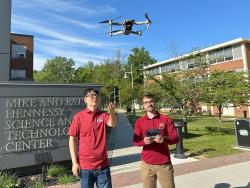Tuesday, Sep 26, 2023
Dr. Duo Lu presents work at prestigious conference and receives NSF grant
by Tatiana Sciancalepore
Dr. Duo Lu of Rider University’s Department of Computer Science and Physics is revolutionizing road traffic safety through the application of artificial intelligence (AI). Through groundbreaking research and a newly awarded National Science Foundation (NSF) grant, Lu is reshaping the landscape of traffic analysis and transportation efficiency.
“In a time where many AI enthusiasts are gravitating toward entertainment-related applications, I hope to harness its potential to save lives and improve infrastructure,” says Lu.
In collaboration with colleagues from Arizona State University, Lu has embarked on a transformative project to develop smart roadside cameras for real-time traffic analysis. Funded by a prestigious NSF grant through the Partnerships for Innovation program, the project aims to revolutionize the way traffic data is gathered and utilized.
“I think we’re currently too reliant on human intervention when it comes to road safety,” says Lu. “In many cases, it is the job of a single officer behind a wall of video monitors to manage what could be potentially invaluable information. All because the infrastructure lacks the technology and resources needed to effectively analyze the data.”

Lu has been exploring innovative methods to address this challenge in his research. In his most recent papers, he explores onboard vehicle-based sensor systems for measuring safety metrics, drone-acquired aerial video to study traffic patterns and the use of an advanced 3D model for accurate vehicle tracking.
“We need to be doing these kinds of proactive studies,” emphasizes Lu. “We cannot just say we’ll improve things after someone has lost their life.”
Lu’s research titled "CAROM Air," an abbreviation for "cars on the map tracked from the air by drones," was presented this past May at the Institute of Electrical and Electronics Engineers (IEEE) International Conference on Robotics and Automation (ICRA) by Matt Weg ’22, who contributed to the work. The conference is the highest-ranked academic conference in the category of robotics and automation, and is considered to be the premier gathering of experts and innovators in this field.
"It was very exciting to be selected to attend ICRA2023," says Lu. "I'm grateful for the dedication and contributions of my talented student-authors Matt Weg ’22 and Eric Eaton ’23 who played an integral role in our research success, as well as the College of Arts and Sciences for its support."
In addition to addressing infrastructure-related issues such as congestion, road planning and repair, Lu’s work may also prove instrumental in the development of autonomous vehicles, potentially revolutionizing the transportation industry as a whole.
